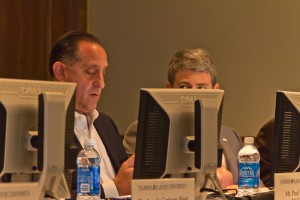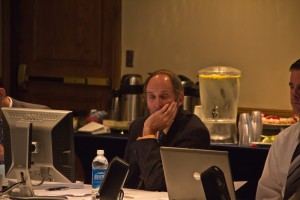
On Oct. 19, the university’s top decision-makers took one step closer to offering students clear protection from sexual orientation-based discrimination.
It’s the same protection faculty already have, according to a university lawyer. It currently doesn’t cover students, which is something Student Government leaders have tried to change since April 2009.
This update would include other changes designed to meet requirements set in April by the federal government for defining sexual harassment.
“I’m satisfied that finally there’s a proposed change,” said Boris Bastidas, Boca campus House Speaker. He is also the author of the 2009 SG legislation that pushed the issue, and is less satisfied with how long the process took.
“Obviously there’s a lot of legal and personnel issues to have been dealt with,” he admitted, alluding to the search for a new university president during the period. “There was some significant transition going on.”
The wait isn’t the only problem, either: The proposed changes include only half of what Bastidas wanted. “The current proposal still does not include gender identity. Last summer, FSU [Florida State University] changed their policy and in one shot put in sexual orientation, gender identity and gender expression.” The latter terms would more clearly include transgender, genderqueer and cross-dressing students.
Bastidas said that’s why he’s planning a rally with “on and off campus organizations” before the Nov. 16 final vote, but details are still being worked out.
Frank Gorritz, the president of FAU Lambda United, could not be immediately reached for comment. The student group works to raise awareness of gender and sexuality issues.
FAU’s Board of Trustees — the 13 appointed, unpaid people who make major university decisions — voted unanimously to recommend changing the university’s anti-discrimination policy, but only after asking several questions and getting a detailed explanation from David Kian, head of FAU’s legal department.
Some other items on the agenda received no questions.
“The Department of Education emphasized the need to identify precisely sexual violence as a form of sexual harassment, and to provide very clear examples,” Kian explained at the meeting. “We are also asking that our protected categories be expanded to include sexual orientation, which will make it consistent with the university’s collective bargaining unit. This expands [protection] to our non-faculty and students as well.”
Examples of sexual harassment in the proposed policy changes include “actual or implied promises of an employment or educational opportunity or benefit in exchange for sexual activity,” “continuing to ask someone for a date after repeatedly being told ‘no’,” and “making sexually explicit or suggestive gestures or sounds.” Kian made a point of explaining that these behaviors were not automatically considered forms of sexual harassment.

“This does not mean that anytime someone tells a sexually oriented joke that they have violated our sexual harassment policy. There must be a finding,” Kian said. That would require a decision that the behavior of the accused made grades or a job seem conditional, interfered with performance or created an “objectively intimidating, hostile or offensive environment.”
Some debate followed Kian’s explanations. Trustee Jeffrey Feingold argued, “We need to add some common sense to this. I don’t know how many charges have been brought up at the university in the past few years, but we need to make sure we don’t end up in a situation like Duke a couple years ago where students were thrown out on trumped up charges.”
Feingold was referring to a 2006 criminal case, where three Duke University lacrosse players were suspended after what was later revealed to be a false accusation of rape. To prevent such a scenario, he argued, the BOT should review harassment cases and have the final say.
Trustee David Feder had a different view. “Our job is not to run the university. We have capable people that can analyze a situation and make a good decision,” he said. Trustee Sherry Plymale agreed, and said, “Our job is to call and ask somebody. We don’t answer it.”
Trustee William McDaniel asked how and whether anonymous harassment complaints work. Kian responded, “It depends on the context of the complaint.” Without detailed information such as dates, times, and potential witnesses, he said, “There’s nothing we can do about that.”
The Board will vote on changing FAU’s policy on Nov. 16. FAU is currently one of two state schools in Florida whose anti-discrimination policy doesn’t cover sexual orientation. The other is FAMU.
According to the U.S. Department of Education, “When young women get to college, nearly 20% of them will be victims of attempted or actual sexual assault, as will about 6% of undergraduate men.”
Anyone at FAU who believes him or herself to be such a victim can contact the FAU Office of Equal Opportunity Programs. Current contact information is available online at www.fau.edu/eop.













